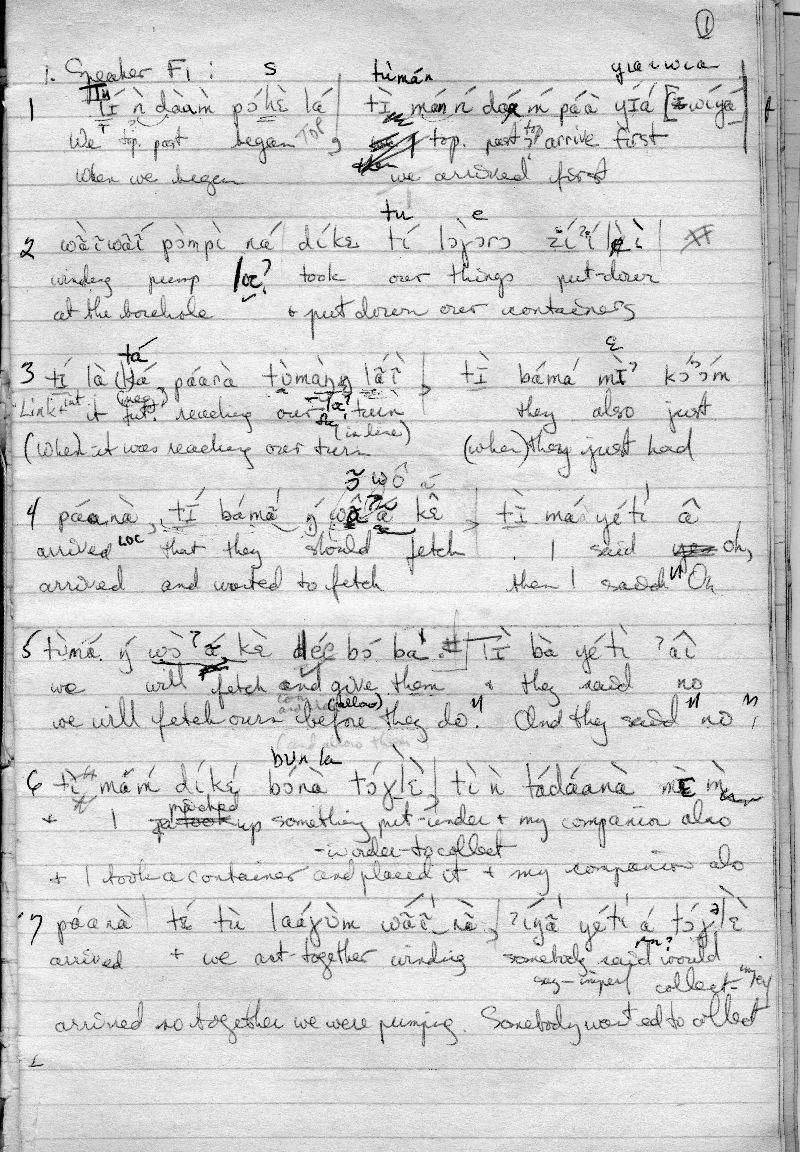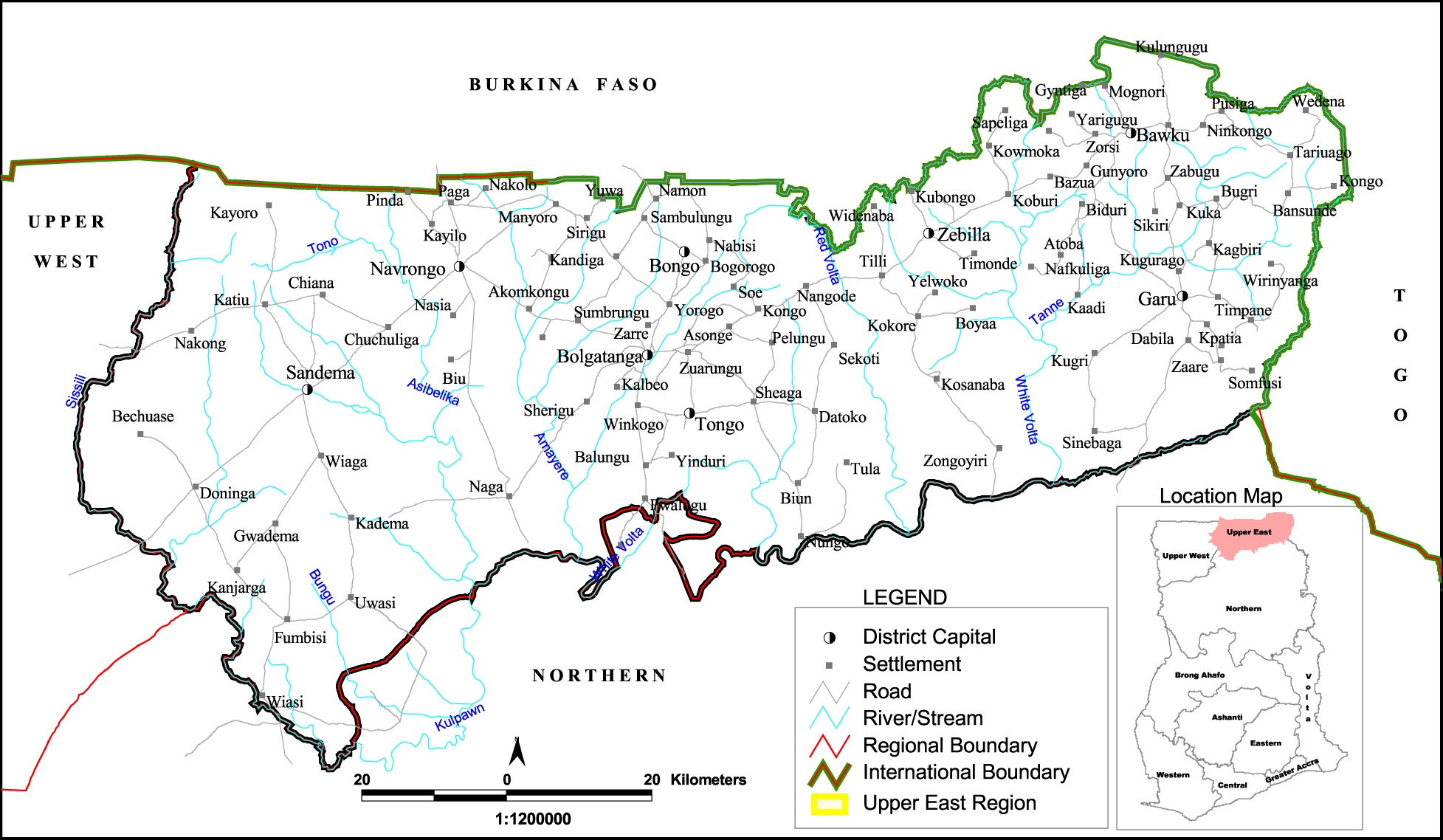Browse
- Browse:
- Interviews
- Maps
- Oral Arts
- View All
Interviews
Interview at Pogaba: A fight between the women of two houses (full transcript)
Date: February 25, 1997Format: Sound/mp3
In the interview the two women describe a quarrel they had been involved in, when a dispute arose over precedence at the local public water tap. A physical fight developed and the police arrived. The women were taken to the police station and appeared in court. The men of the family eventually bailed them out and settled the case among themselves because they were in the middle of celebrating a funeral and didn't want it interrupted. The women were asked how they felt about not being consulted over the settlement, the details of which they did not know. They felt that they had no choice in the matter.
Interview at Pogaba: A fight between the women of two houses (short transcript)
Date: February 25, 1997Format: Sound/mp3
In the interview the two women describe a quarrel they had been involved in, when a dispute arose over precedence at the local public water tap. A physical fight developed and the police arrived. The women were taken to the police station and appeared in court. The men of the family eventually bailed them out and settled the case among themselves because they were in the middle of celebrating a funeral and didn't want it interrupted. The women were asked how they felt about not being consulted over the settlement, the details of which they did not know. They felt that they had no choice in the matter.
Three Interviews at Tanzui: A child custody dispute
Date: June 2000Format: Sound/mp3
The second and third interviews are continuations of the first, in an attempt to find out if the cse was finally resolved. The interviewee had a case in the Bongo and Bolga Chiefs' courts. Her daughter had been divorced by a Bongo man. The issue was whether the interviewee would let the father's family take back the daughter's child before they had returned some bowls she had given her daughter and paid medical expenses she had incurred for the child. She also felt that her daughter had been badly treated. In this patrilineal society the father's family is normally entitled to custody of children, and the interviewee did not dispute that. It appears that the chiefs' courts, which are entirely male, did not take the case very seriously. The grandchild, about 6 years old, was present during the first two interviews. The transcription is broadly phonetic.
Interview with Chief of Bongo: The history and continuation of Bongo state
Date: June 27, 2000Format: Sound/mp3
The Bongo Naba (chief of Bongo) gives the foundation myth of the Bongo state, how he was installed as chief, eligibility for the chieftaincy, the other chiefs and their roles, the functions of the spokesman and the "land owner" in relation to the functions of the chief, and the cases the chief's court hears. The spokesman then amplifies the account.
Interview at Gowrie: Language Use in the Upper East Region
Date: September 2001Format: Sound/mp3
The interviewee, who came from the south of Ghana, describes her own background and what languages were spoken by members of the family. Both she and her husband are literate. Her children usually speak Fante to her but Gurene (major Farefari dialect) to their father. The interview was conducted in Gurene, which she spoke fluently. A certain amount of code-mixing with English is observable but this is not unusual in speakers who have been to school.
Interview with Chief of Farefari people living in Accra
Date: July 18, 2002Format: Sound/mp3
The interviewee discusses his life in Accra and particularly how he came to be a Muslim, and how he became chief. He also discusses the function of the chief of an expatriate community in Accra.
Interview at Legon Staff Village: Observations on Life in Accra
Date: May 22, 2005Format: Sound/mp3
The interviewee was asked to discuss problems associated with living in Accra. She mentioned in particular difficulties with relatives of her husband. She thought on the whole it was better back home, but with hard work one could manage.
Interview at Maamobi: Living in Accra
Date: May 28, 2005Format: Sound/mp3
The original plan was to interview R's mother-in-law, but she could not be there and R agreed to be interviewed instead. She did not feel she had any particular problems with her in-laws, but described a dispute between her husband and his best friend as an example of the sort of problem that was likely to arise.
Maps
Oral arts
Three Stories
Date: March 20, 2009Format: Sound/mp3
Three folktales are given, one of the type considered "short", one "long" followed by a second short one. Tales in the language are are frequently told in short and long pairs. The audience, in this case Abii and Akabare, respond to and comment on what the tale teller says. The stories all contain songs, which is typical of the area.
Two Stories
Date: March 20, 2009Format: Sound/mp3
Two folktales are given, of the type considered "long." Typically for the area, the audience (here Abii and Akabare) respond to and comment at each stage of the story, and the narrator uses songs to move the story along.









